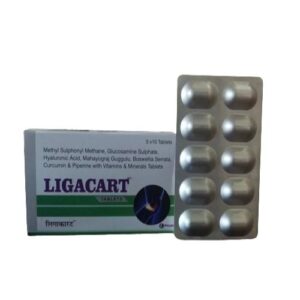GLUCOSAMINE SULPHATE + METHYL SULPHATE + DIACEREIN
Glucosamine Sulphate: Glucosamine Sulphate is a dietary supplement commonly used for the management of osteoarthritis. It is a natural compound found in the cartilage of our joints.
The exact mechanism of action of Glucosamine Sulphate is not fully understood. However, it is believed to work by stimulating the production of cartilage components such as glycosaminoglycans and proteoglycans. These substances help to maintain the structure and function of the joints and may also have anti-inflammatory effects.
The recommended dose of Glucosamine Sulphate varies depending on the specific product and individual needs. Generally, the standard dose for osteoarthritis is 1500 mg of Glucosamine Sulphate taken once daily. It is important to follow the instructions provided by your healthcare provider or the product packaging.
Glucosamine Sulphate is generally well-tolerated, but some individuals may experience side effects. Common side effects include mild gastrointestinal symptoms such as nausea, diarrhea, and abdominal pain. Allergic reactions, such as rash, itching, or swelling, are rare but can occur. It is important to consult with a healthcare professional if you experience any unusual or severe side effects.
It is worth noting that Glucosamine Sulphate is not recommended for individuals with shellfish allergies, as it is derived from the shells of shellfish. Additionally, it may interact with certain medications, such as blood-thinning drugs, so it is crucial to inform your healthcare provider about all the medications you are taking before starting Glucosamine Sulphate.
Overall, Glucosamine Sulphate is a popular dietary supplement used for osteoarthritis management. While it may provide relief for some individuals, it is essential to consult with a healthcare professional to determine if it is appropriate for your specific condition and to discuss any potential risks or interactions.
Methyl Sulphate: I’m sorry, but there is no drug called Methyl Sulphate. Methyl Sulphate is not a specific drug, but rather a class of compounds. “Methyl Sulphate” refers to the combination of a methyl group (CH3) and a sulfate group (SO4) attached to a molecule.
If you are looking for information on a specific drug, please provide the correct name, and I would be happy to assist you further.
Diacerein: Diacerein is a medication primarily used for the treatment of osteoarthritis. It is a symptomatic slow-acting drug in osteoarthritis (SYSADOA) that helps to reduce pain and improve joint function in patients with this condition.
The mechanism of action of diacerein is not fully understood, but it is believed to work by inhibiting the synthesis of pro-inflammatory cytokines, such as interleukin-1β and tumour necrosis factor-alpha. These cytokines play a significant role in the inflammation and degradation of joint cartilage seen in osteoarthritis.
The usual recommended dose of diacerein is 50 mg taken orally once daily, with or without food. It is important to follow the prescribed dosage and duration of treatment advised by your healthcare provider. The therapeutic effects of diacerein may take several weeks to become noticeable, so it is advisable to be patient and continue with the medication as directed.
Like any medication, diacerein can have some side effects. The most common side effects observed in clinical trials include gastrointestinal symptoms such as diarrhea, soft stools, abdominal pain, and nausea. These side effects are generally mild to moderate in severity and often resolve on their own without the need for discontinuation of the medication.
In rare cases, severe liver injury has been reported with the use of diacerein. Therefore, it is essential to regularly monitor liver function during treatment with this medication. If any signs of liver dysfunction, such as jaundice (yellowing of the skin or eyes) or elevated liver enzymes, are observed, immediate medical attention should be sought.
It is important to note that diacerein is contraindicated in patients with severe liver impairment, patients with inflammatory bowel disease, patients with severe renal impairment, and patients who are breastfeeding or pregnant.
As with any medication, it is advisable to consult with a healthcare professional for more detailed and individualized information about diacerein, its benefits, risks, and potential interactions with other medications or medical conditions.

